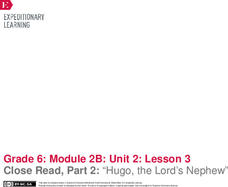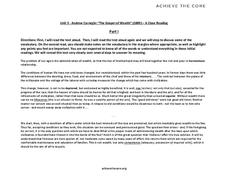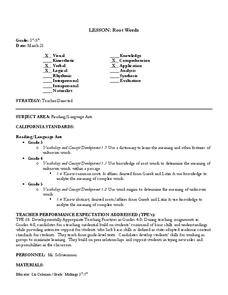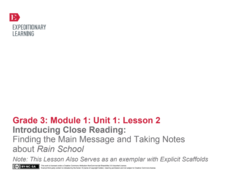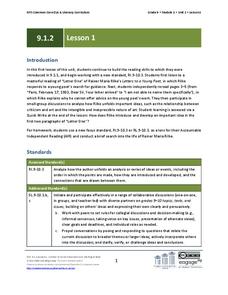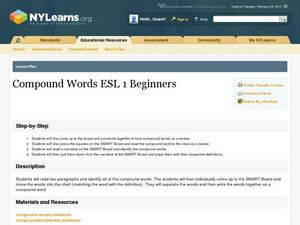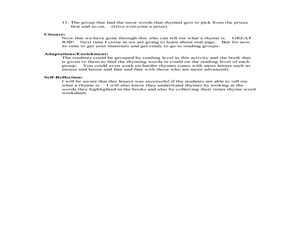Novelinks
The House on Mango Street: Vocabulary Word Squares
Chanclas, muerto, cuando. Spanish words are plentiful in The House on Mango Street and may be unfamiliar to many readers. A vocabulary words squares activity will help kids remember the meaning of these words and add to their...
Curated OER
Edgar Allan Poe Short Story WebQuest
Introduce your class to Edgar Allan Poe with a series of mostly self-guided tasks and assignments. Class members follow the list of tasks, starting by watching a video with background information and ending with a compare-and-contrast...
EngageNY
Close Read, Part 2: “Hugo, the Lord’s Nephew”
No, not literally. Scholars read Hugo, the Lord’s Nephew to compare figurative and literal language. Readers learn about simile, metaphor, personification, and idioms with a graphic organizer. Pupils then answer text-dependent questions...
EngageNY
Simplifying Square Roots
Explore the process of simplifying square roots through an analysis of perfect squares. The fourth lesson of 25 expects individuals to find the perfect square factors in each radicand as a means of simplifying. The perfect square factor...
Curated OER
The Gospel of Wealth by Andrew Carnegie: A Close Reading
Andrew Carnegie's "The Gospel of Wealth" provides high schoolers an opportunity to engage more complex text. After a close reading of the essay and an analysis of Carnegie's argument that the rich are superior because they earn money,...
Haut Gap Middle School
Root Words
Scholars demonstrate their knowledge of root words aqua and aud, and develop vocabulary skills by completing of a chart, handout, and worksheet using creative thinking skills, a dictionary, and a thesaurus.
EngageNY
Introducing Close Reading: Finding the Main Message and Taking Notes About Rain School
This second lesson in a larger unit is perfect for the beginning of the year because it explicitly teaches 3rd graders how to use close reading skills by identifying unfamiliar words, figuring out the gist, and defining important...
English Enhanced Scope and Sequence
Identifying Synonyms
"Let the hunt begin!" As an introduction to synonyms, second graders generate a list of word pairs that have similar meanings. The words pairs are written on sentence strips, cut apart, shuffled, and distributed to class members who must...
EngageNY
Mid-Unit Assessment: Close Reading of Bullfrog at Magnolia Circle: Bullfrog Life Cycle
The sixth lesson plan in this Bullfrog at Magnolia Circle unit assesses your third graders' ability to read and understand informational text. The included assessment asks learners to take notes about the main idea and supporting details...
Curated OER
When is a Noun a Verb? Examining Double Duty Words
Act and act, address and address...there are so many words in our dictionary that can function as nouns or verbs. Start this lesson by having your class list as many as they possibly can. When an adequate list presents itself, have your...
Curated OER
Introduce Vocabulary: Everybody Cooks Rice (Dooley)
Use Norah Dooley's culturally inspiring book Everybody Cooks Rice to explore delicious new vocabulary in context with beginning readers. The recommended words here are: delicious, grumbling, and gulp; pre-teach them before reading the...
Curated OER
Introduce Vocabulary: I See Animals Hiding (Arnosky)
Animals are amazing at disguise! Explore the different ways they escape view as scholars learn vocabulary-in-context through Jim Arnosky's book I See Animals Hiding. Prepare pupils to raise their hands when they hear the words by...
Curated OER
Word Association Poetry with Visual Thesaurus (or Not)
Young poets get inspiration and guidance for making word association poems with the Visual Thesaurus. Your class could complete this project with nothing more than a pencil and paper as well. A nice one-off for a substitute during your...
Institute for the Professional Development of Adult Educators
Using Context Clues with Signal Words
When you come across an unfamiliar word in a text, do you skip it and move on? Practice using context clues to identify words you don't know with a thorough set of language arts lessons. The resource reinforces close reading and critical...
EngageNY
Grade 9 ELA Module 1: Unit 3, Lesson 13
Readers examine the conversation between Friar Laurence and Romeo in Act 3, scene 3 of Romeo and Juliet and consider how Shakespeare's word choices impact the development of Romeo's character.
EngageNY
Grade 9 ELA Module 2, Unit 3, Lesson 10
Did Bernie Madoff fit the profile of a Ponzi schemer because, as Diana Henrique contends in an excerpt from her The Wizard of Lies: Bernie Madoff and the Death, he “did not fit the profile of a Ponzi schemer”? Huh? Groups begin their...
EngageNY
Grade 9 ELA Module 1, Unit 2, Lesson 1
Where does a writer find inspiration? "Go into yourself," says Rainer Maria Rilke in "Letter One" from Letters to a Young Poet. Readers of Rilke's letter to Franz Xaver Kappus examine the words and figurative language Rilke uses to...
Meadows Center for Preventing Educational Risk, University of Texas at Austin
Lesson 10 - Compound Words
Individually, words have power, but when added together, they can take on a whole other level of meaning. Readers learn about compound words in the 10th of 17 lessons of the Word Recognition and Fluency series. A script provides guidance...
Curated OER
Using Word Referents
Young scholars edit an existing piece of writing focusing of improving word choice. They create lists of words that can be used in place of the main topic and rewrite the piece using the new vocabulary.
Curated OER
How Do I know That a Book Is Just Right for Me to Read?
Students choose a book for reading. In this language arts activity, students take steps to evaluate a book for free reading. Students make a list of words found in the book that they are unfamiliar with.
Curated OER
Shared and Guided Reading with Ice Cream Money
Here is a lesson which has young scholars locate an exclamation point and a comma from the text. They locate previously learned words on the page, and create a word map from the word "Money." Students write about and illustrate their...
Curated OER
Compound Words ESL 1 Beginners
Bring vocabulary to life with this SMARTboard activity! With a list of (linked) compound words, learners combine each part of the word to complete the compound word. They then read a narrative and identify the compound words. The last...
Curated OER
Responding Syllables: Reading and Music
Shell Silverstein’s “Sick” provides an opportunity for kids to demonstrate their understanding of syllables and phonemes. The class creates a list of descriptive words used in the poem that have more than one syllable, and brainstorm how...
Curated OER
The Wonderful Pigs of Jillian Jiggs: Rhyming Words
Readers explore rhyming words. They will use the story The Wonderful Pigs of Jillian Jiggs to identify rhyming words. Then they will create their own lists of rhyming words. In the end, they will be able to come up with words that rhyme...




